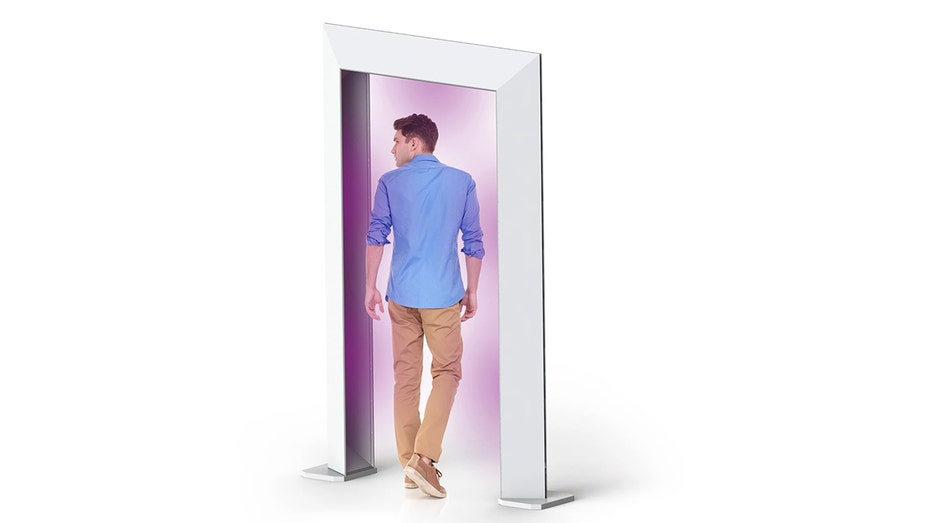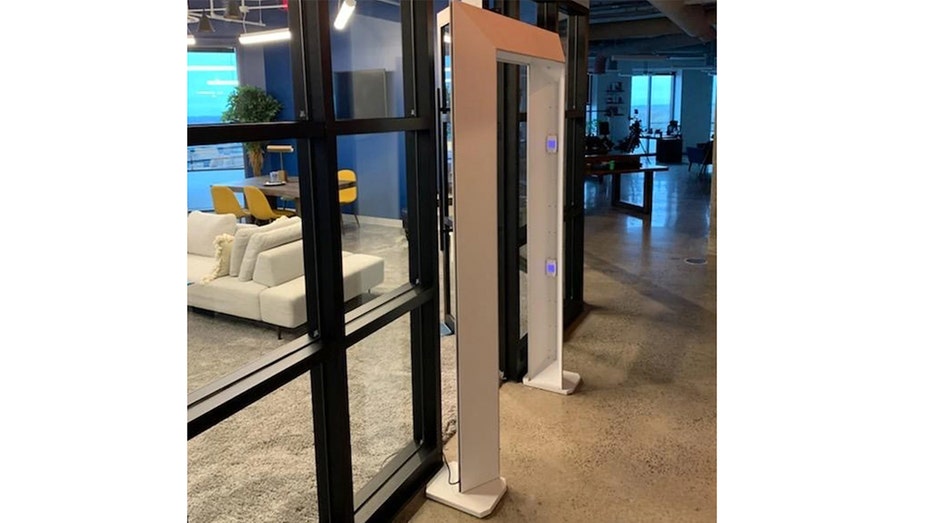Far-UVC light could be 'game changer' in coronavirus fight, researchers say
According to Columbia University researchers, far-UVC can kill viruses and bacteria on the surface without harming human beings
Get all the latest news on coronavirus and more delivered daily to your inbox. Sign up here.
Lighting science technology company Healthe is offering a new product that may be a "game changer" for businesses looking to mitigate the spread of coronavirus as state economies re-open and employees head back to work.
The company's chief technology officer, former NASA scientist Fred Maxik, has developed the Cleanse Portal, which uses ultraviolet light to sanitize the surface of any person who steps into it.

Cleanse Portal (Healthe)
According to Maxik, the Cleanse portal disrupts the ability for viruses and bacteria to replicate, deactivating roughly 90 percent of pathogens on your skin and clothes in roughly 10 to 12 seconds.
"[The Cleanse portal] is protecting you from bringing these pathogens into the environment," Maxik said. "To the degree that everyone's been through [coronavirus] and no one in the environment is sick, that will protect you for your day at work."
While the portal does not protect against someone who contracts a virus while on the job or who comes into work sick, Maxik says far-UVC can at least help mitigate the coronavirus' spread by "reducing the load of pathogens in an environment."
Researchers at Columbia University are studying far-UVC effectiveness against coronavirus, and the Food and Drug Administration has yet to approve the product.
Maxik believes that the Cleanse portal offers peace of mind that "when you enter into a business establishment you feel like you are being taken care of."
SANITATION DEVICE CLEARS CORONAVIRUS, BACTERIA FROM PHONE, KEYS
While too much ultraviolet light poses a risk to human beings, Maxik says there is overwhelming evidence suggesting that using far-UVC light is safe.
"There's always some degree of unmeasurable risk that you just don't know how to quantify today, but the studies that are out there are very clear that this is a safe alternative to other methodologies we might use," he said. "They all come to the same conclusion, that this is a human safe approach to working to disrupt pathogens in our environment."
Columbia researchers found that low doses of roughly 220 nanometers of ultraviolet light, known as far-UVC, can kill viruses and bacteria without harming human skin, eyes and other tissues. Researchers found that far-UVC was successful in inactivating the airborne H1N1 influenza virus, as well as drug-resistant bacteria, just minutes after they were breathed, coughed or sneezed into the air.
"Far-UVC light has the potential to be a 'game changer,'" said professor of radiation biophysics and director of Columbia's center for radiological research David Brenner, "It can be safely used in occupied public spaces, and it kills pathogens in the air before we can breathe them in."
Brenner added that far-UVC offers a "fundamentally different tactic in the war against COVID-19."
"Most approaches focus on fighting the virus once it has gotten into the body," Brenner said. "Far-UVC is one of the very few approaches that has the potential to prevent the spread of viruses before they enter the body."
According to Brenner, the price tag for average far-UVC lamp is roughly $500-$1,000, which he believes will likely fall once the lamps can be mass-produced.
CORONAVIRUS N95 MASK SHORTAGE PROMPTS HOSPITALS TO DECONTAMINATE AND REUSE
The Cleanse portal costs roughly $3-$4 dollars per square foot for a business, which Maxik says is a relatively small cost to get employees back to work in a comfortable and safe way. It includes the portal, far-UVC lamps and an air cleaner.

Cleanse Portal (Healthe)
While the portal is meant for office spaces and retail locations, Maxik says it can be implemented pretty much anywhere once a larger scale unit is available.
"I would think the first [place] is going to be office spaces where you really want to bring people back to work, retail spaces where you want to bring people back in and out of space and then also in public buildings where you have a transient flow of folks going in and out of the space that would benefit from this," he said. "I think as we get to more of a larger scale, we're working on some larger scale units, I can also see as being appropriate to some transportation areas and hospitality as well."
Currently, Maxik says that his company currently has the capacity to produce hundreds of portals within several weeks. In roughly six to eight weeks, the company would be able to scale thousands once the product is given the green light by the FDA for mass production.
GET FOX BUSINESS ON THE GO BY CLICKING HERE
Despite some skeptics of far-UVC's effectiveness, Maxik says it's important to let science lead us if it potentially shows promise in getting people back to work.
"We've got a good system to help us reproach what's going to be normal in the future and help us get there," Maxik said. "We need to get this country back to work again. I'm an optimist by nature, but this gives us the ability to bring people back into the environment to earn livings and take care of their families and get the country back moving again."
CLICK HERE TO READ MORE ON FOX BUSINESS




















